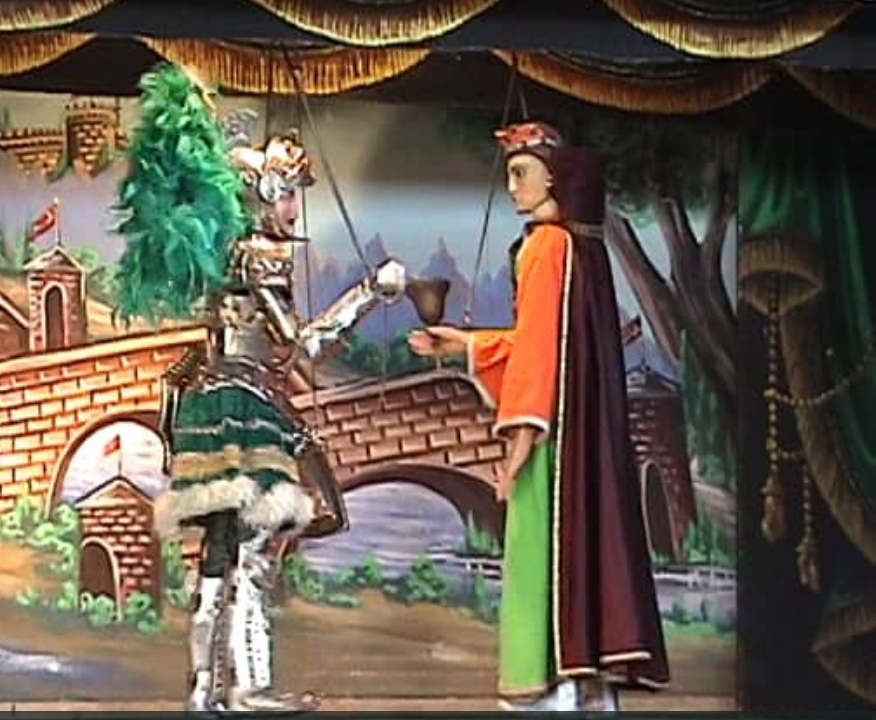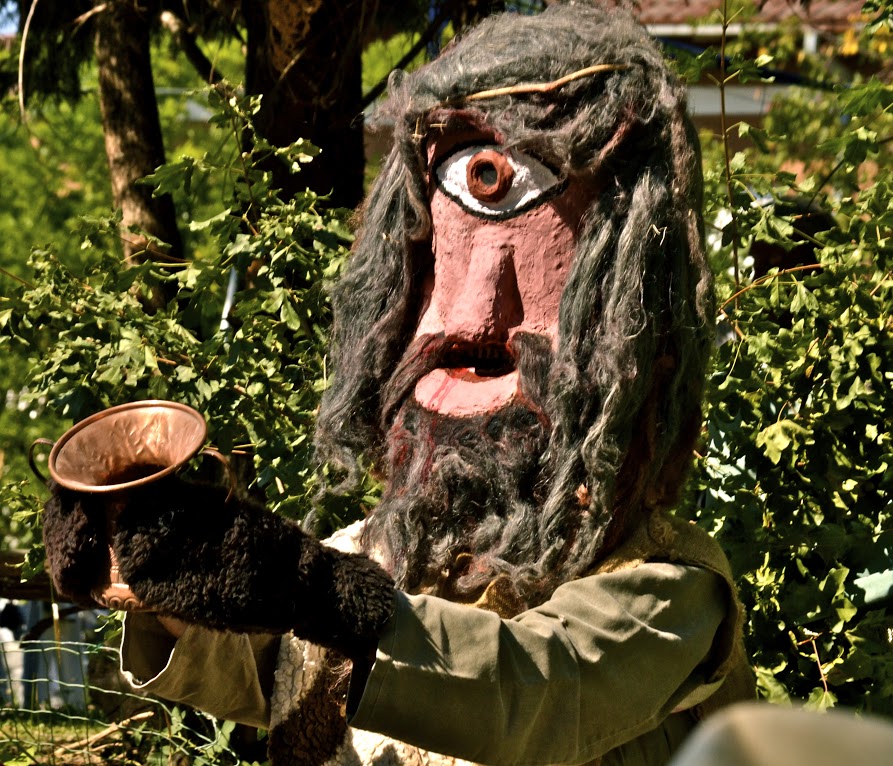2020.09.30 | By Jo Ann Cavallo
Inspired by Gregory Nagy’s playful experiment and thought-provoking introduction to the Odyssey, I’d like to join in the fun by responding to some of the points raised in his essay from the perspective of the Italian Renaissance romance epic.

If, as noted, it is not possible to delve deep into Odysseus’s story in the Odyssey without relating it to “the contrasting story of Achilles in the Homeric Iliad,” the situation repeats itself indefinitely as subsequent heroic characters act in ways that recall their commonalities and differences with respect to both of these Homeric protagonists. In particular, the inescapable juxtaposition of Achilles and Odysseus prompted me to think forward to episodes in which the knight Orlando (the Italian refashioning of the Frankish Roland) was explicitly measured against Odysseus in Matteo Maria Boiardo’s fifteenth-century Orlando Innamorato.
Boiardo’s early readers would have been familiar with Virgil’s example of developing a character in opposition to his Greek counterparts. While Odysseus had endangered his men by leading them inside Polyphemus’s cave, Aeneas prudently keeps his crew safe through his quick departure after happening upon the same coastline (Aeneid III). Indeed, Virgil made Odysseus look even more flawed by imagining that the Greek leader had uncaringly left behind a fellow Ithacan. The pious Aeneas, by contrast, takes his former enemy on board when the stranded man pleads to be rescued from the cyclopes. Boiardo revisits this setting in an adventure that separates his hero Orlando even further from Odysseus’s precedent (OI 1.6.24-36).
Whereas Odysseus needed the help of his companions to merely blind the drunken sleeping Polyphemus, Orlando fights a cyclops-like creature single-handedly using his opponent’s own weapons. Unable to gain victory by wielding the giant’s club, the quick-thinking knight grabs his nearby spear and lunges it into his single eye, thereby blinding and killing him in one fell swoop.

Yet it is not Orlando’s superior strength alone that distinguishes him from Odysseus, but rather his motivation and attitude. First of all, whereas Odysseus initially intruded into the cyclops’s private space and helped himself to his possessions, Orlando acts in self-defense against a giant who appropriated the knight’s sword and attacked him in a public space. Odysseus, after blinding Polyphemus, was stuck inside the cave until the cyclops himself removed the boulder, and the ruse he devised was to save himself as much as his men. By contrast, Orlando, after killing the cyclops and thus protecting future travelers from danger, approaches the cave with the sole intention of liberating those trapped inside, whose “loud laments, / words, wails, and cries” are coming “from down below” (OI 1.6.37). And lest readers think that the boulder Orlando removes from the cave’s entrance is of lesser size than the one used by Polyphemus, Boiardo specifies that it was a whopping ten feet by ten feet and one and a half feet thick.
Odysseus, although initially saving himself and his men by remaining anonymous and referring to himself as “nobody,” later boastfully proclaims his name and brings Polyphemus’s curse upon him. His urge to reveal his identity and thereby gain kleos causes undue grief, putting at risk his nostos and indirectly costing his companions their own. By contrast, at no point does Orlando draw attention to his identity in the episode. Boiardo seems to go out of his way to enforce anonymity through the speed with which he recounts the rescue and immediate dispersal in all directions of the freed captives: “The prisoners were freed at once, / and each one went anywhere he wished” (OI 1.6.38). The knight’s other-regarding action, undertaken as a matter of course without any need for recognition, is in contrast to the self-serving and questionable choices of his Homeric model.
Although in this case Orlando exhibits greater virtue and valor than Odysseus, he does not always fare so well. Shortly after this successful adventure, the Frankish paladin comes upon another perilous site and falls into a trap from which he cannot free either himself or others. Waiting nearby is the Circe-like fairy Dragontina who invites everyone who approaches to drink a cup of liquid that renders them both oblivious to their own selves and utterly enamored of her. Upon tasting the potion, Orlando immediately joins the ranks of the other mindless victims (“smemorati”; OI 1.9.74) who are deprived of their intellect (literally, “fuora d’intelletto”; OI 1.9.67).
One could argue that Odysseus was able to avoid the sirens, leave Circe of his own free will, and even turn down Calypso’s offer of immortality because his ultimate goal was to return to his beloved wife and his home. In Virgil’s refashioning of such seductive predicaments, Aeneas abandons the Carthaginian queen Dido to found a new homeland in Rome where a future wife is destined for him. Boiardo’s Orlando, on the other hand, has deserted his wife and Charlemagne’s court in order to search for Angelica of Cathay after falling head over heels in love with the enchanting princess at first sight. Indeed, it is just when “in his mind it seemed as if / he’d won the maid and she was his” (OI 1.6.43) that he comes across Dragontina and her crystal chalice. Having already abandoned his faculty of reason to pursue a passion-driven illusion, Orlando unhesitatingly accepts the fairy’s invitation to drink and as a result forgets not only his love for Angelica, but also his duty to Charlemagne, his entire past, and his very identity. Without his memory or sense of self, Orlando cannot escape of his own accord.
Boiardo explicitly evokes the Odyssey in this adventure through an ekphrasis recounting a story about “Circella” and “Ulixe” painted on three walls of Dragontina’s loggia (OI 1.6.49-53). Rather than extracting a warning message from the tale, however, Orlando stares at the painting for the pure pleasure of it (“per diletto”; OI 1.9.74). Orlando’s situation is not unique, however, either in Boiardo’s poem or in later Italian Renaissance romance epics. Subsequent heroes are almost invariably waylaid by an alluring female character playing the role of Circe and Calypso (or Dido, through the mediation of the Aeneid). By the late sixteenth century, moreover, the sensual paradise is transformed from a deleterious way station to a blissful destination, reflecting perhaps a climate of resistance to increasing repression by political as well as ecclesiastical authorities.
Keeping our focus on Boiardo’s Orlando, we may ask why the indomitable victor over the cyclops and liberator of his prisoners falls so easily victim to Dragontina’s Circe-like ploy. Could it be that the other-regarding mindset motivating his action in the former case facilitates his success while his irrational love for a wily princess makes him vulnerable to similar sensory traps? Or is it rather that the power of infatuation is so strong that it overcomes even the most stalwart of heroes who would otherwise act in the interest of others? After all, the Innamorato opens with the admonition that “No strong arm, / no audacity, / no blade well-honed, no shield or mail, / no other power can avail, / for in the end Love conquers all” (OI 1.1.2). Whatever interpretation one may advance, the fact that both episodes traced briefly above directly call into play the Odyssey invites the reader to consider Orlando vis-à-vis his contrast to Odysseus.
The heroes of the Orlando Innamorato are dependent on their Homeric precedents not only in a narratological sense, but also (within the fiction of the poem) in a genealogical one. Boiardo follows a medieval literary tradition that traced Charlemagne’s lineage back to the Trojans. As the nephew of Charlemagne, Orlando descends from the same family tree. In addition, the poet devises a fresh Homeric genealogy for a new hero who outshines all others in chivalric excellence: the North African knight Rugiero.
Although the Innamorato hero who “surpassed / all other men the world has known” (OI 1.29.56) first appears in the Atlas Mountains in an episode that recalls the discovery of Achilles by Odysseus on Skyros, he later traces his ancestry back to the foremost enemy of Achilles, Hector of Troy. In keeping with the Italian literary tradition of disparaging the Greeks in favor of the Trojans, Boiardo imagines that Hector’s son Astyanax escaped an early death thanks to the resourcefulness of his mother. Just as Rugiero’s immediate heritage is mixed—his father is a Southern Italian Christian and his mother is part North African Saracen and part Amazon—the youth combines the upright qualities of the ancient hero Hector with the medieval chivalric virtue of cortesia. Acting humanely toward friend and foe alike, Rugiero illustrates the compelling, even contagious power of courtesy in a world largely dominated by violence and unbridled ambition.
Boiardo bridges the gap not only between classical and Renaissance heroes but also between fiction and history by claiming that Rugiero is the actual ancestor of the poem’s dedicatee, the reigning Duke of Ferrara. Moreover, Rugiero falls in love with and is destined to marry the poem’s preeminent female warrior Bradamante, whose own genealogical line likewise runs back to Hector of Troy as well as forward to the current Duchess of Ferrara. The point I wish to make here is that according to both narrative invention and purported genealogy neither the poem’s eponymous hero Orlando nor the even greater hero Rugiero would have come into existence had it not been for the heroes of the Iliad and the Odyssey. Nor—according to the account of the lineage extended into the present—would the poem’s very dedicatee and his wife and their family members have ever been born.
Although the contrast between Achilles and Odysseus is more evidenced because of the “symmetrical evolution” of their stories, it is almost impossible to understand many later literary figures in the European chivalric tradition without measuring their actions against the heroes of Homeric epic. In one sense, this situation makes their identity at least partially dependent on the protagonists and stories that preceded them. In another sense, however, it acknowledges the fact that we do not exist in a vacuum but rather are surrounded by both flesh-and-blood and fictional models who have acted according to a value scale that we may or may not share as we navigate our own individual journeys through life.
Citations from the Orlando Innamorato are from the Italian text edited by Andrea Canova (BUR, 2011) and the English translation by Charles S. Ross (Parlor Press, 2004). Some of the points made above can be found in a different context in my earlier work, notably Boiardo’s “Orlando Innamorato”: An Ethics of Desire (1993); The Romance Epics of Boiardo, Ariosto, and Tasso: From Public Duty to Private Pleasure (2004); and The World beyond Europe in the Romance Epics of Boiardo and Ariosto (2013).
